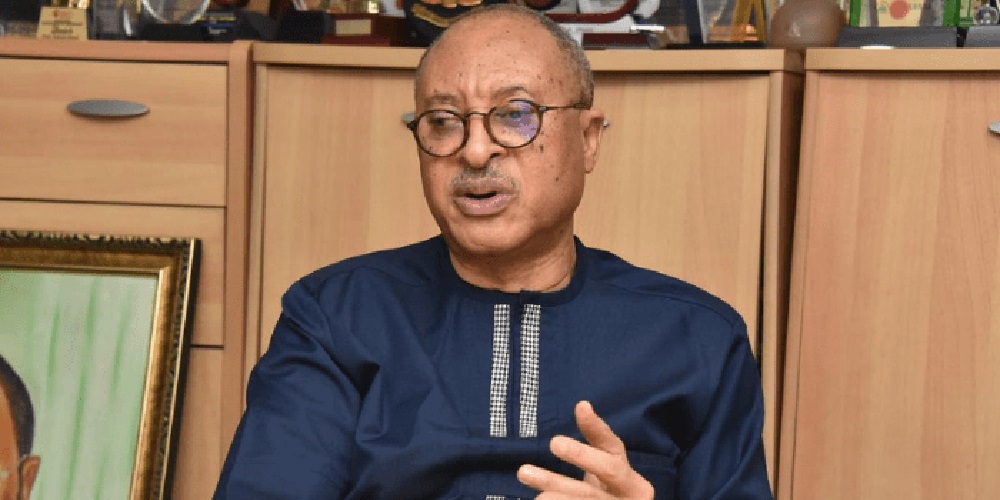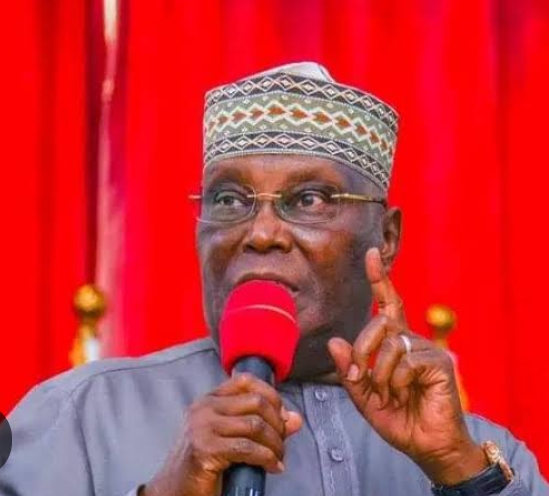News
Nigeria’s poverty level shameful, says Utomi

Prominent political economist and former presidential aspirant, Prof. Pat Utomi, has expressed grave concerns over the high poverty levels in Nigeria, deeming them “shameful.”
Speaking at the launch of ‘The New Tribe’ during a Global Village Square Town Hall meeting at Four Points By Sheraton in Victoria Island, Lagos, Utomi lamented the fact that Nigeria has more poor people than India, despite the latter having a population seven times larger.
Utomi stated, “This country of great potential, as we celebrate 64 years of independence, is still crawling. It has become the place of domicile for the poorest people on the planet. The Brookings study a few years ago showed how, in absolute numbers, there are more poor people in Nigeria than in India. That should make anybody feel ashamed. How? Explain to me how the richest can become the poorest.”
He highlighted the deterioration of values in Nigeria, attributing it to the country’s ongoing issues.
He emphasised the need for citizens to engage with the problems facing Nigeria and work towards solutions.
“Fundamentally, progress is dependent on culture, on your values. And if you look at Nigeria, the one clear thing is the collapse of culture. The values have gone south. I mean, people don’t have a sense of shame anymore. Our political class is an embarrassment,” he remarked.
Utomi also pointed out the failing institutions in Nigeria, particularly in the justice sector, which he believes deter investors from coming to the country.
He noted, “The Nigerian judiciary is considered a joke around the world. Nobody takes it seriously. Investors don’t come to Nigeria because they say to you, ‘If I have a dispute with a partner in Nigeria, going to court is a waste of time. Complete waste of time.’ And so they go to a country where the returns can be less, but where at least they know some justice can be obtained from the courts.”
Regarding ‘The New Tribe’ initiative, Utomi explained that it aims to unite like-minded individuals with progressive ideas to foster development without relying solely on government action.
He emphasised the important role of the Nigerian diaspora in the country’s transformation, drawing parallels with the historical development of nations like Japan, India, and China, which benefited from their diasporas.
“The diaspora has a fundamental role to play in the transformation of our country,” he said, adding that the initiative seeks to foster a spirit of ‘Ubuntu’—the idea that “I am because we are.”
One of the initiatives under ‘The New Tribe’ focuses on leveraging the expertise of medical professionals in the diaspora to improve health services in Nigeria, particularly in first aid training and emergency care.
The event featured notable speakers, including Dr. Yinusa Tanko from the Obidient Movement, human rights lawyer Femi Falana (SAN), Executive Director of Enough is Enough Yemi Adamolekun, former Secretary-General of the Commonwealth Chief Emeka Anyaoku, and Nana Kazaure.
The Founder and Executive Director of the Convention on Business Integrity in Nigeria, Soji Apanpa, emphasised the importance of public accountability, urging Nigerians across all tribes to uphold ethical standards.
He stated, “Values matter in tribes. There’s a central theme running through the conscience of anyone who is in this new tribe, which is that we do things right and we do the right things.”
The event culminated in the signing of a Memorandum of Understanding (MoU) focused on emergency services between ‘The New Tribe’ initiative and three state governments, with Nasarawa State’s Commissioner for Health, Dr. Gaza Gwamna, signing alongside Utomi.
News
Top 10 African countries who received most U.S. HIV/AIDS Assistance in 2024

HIV/AIDS is a big health problem in many African countries and the U.S. offers help by giving money through USAID and PEPFAR (President’s Emergency Plan for AIDS Relief). This money helps people get treatment, prevention, and care for HIV/AIDS.
The Trump administration has decided to stop sending medicines for HIV, malaria, and tuberculosis and medical supplies for newborns to USAID-supported countries, according to a memo seen by Reuters.
On Tuesday, USAID contractors and partners were told to stop work immediately, sources said. This is part of a freeze on U.S. aid, which started when Trump took office on January 20, while officials review programs.
The U.S. has also stopped all financial aid, including funds for roads, energy projects, diversity programs, and foreign aid. This has raised global concern. Many African countries, which rely on USAID for healthcare, especially HIV/AIDS treatment and vaccines, will suffer the most.
Here are the top 10 African countries that get the most HIV/AIDS support from the U.S. in 2024:
1. South Africa – $250 million
South Africa has the highest number of people living with HIV in the world. About 8 million people have the virus, which is 13.1% of the total population. Among adults aged 15 to 49, the infection rate is even higher at 19%. In 2017, over 126,000 deaths were caused by HIV/AIDS. The U.S. gives the most funding to South Africa for HIV treatment and prevention.
2. Mozambique – $239 million
Mozambique has one of the highest HIV rates in Africa. 11.5% of adults aged 15 to 49 have the virus. Over 1.6 million people are affected, including 990,000 women and children. In 2018, about 34,000 people died from AIDS-related illnesses. The U.S. helps provide antiretroviral treatment (ART) for over 800,000 people in the country.
3. Nigeria – $220 million
Nigeria has the third-highest number of people living with HIV. In 2018, the HIV rate among adults aged 15 to 64 was 1.5%. The South-South region of Nigeria has the highest rate at 3.1%. The Nigeria HIV/AIDS Indicator and Impact Survey (NAIIS), funded by the U.S., helps track and control the disease.
4. Zambia – $215 million
HIV/AIDS is common in Zambia, with 11.3% of adults aged 15 to 49 having the virus. In 2000, about 1 million people were affected, and 60% were women. The epidemic has left 600,000 children without one or both parents. The Copperbelt and Lusaka provinces have the highest infection rates.
5. Uganda – $194 million
Between 2005 and 2013, new HIV infections in Uganda increased by 10%. Every week, about 570 young women (aged 15 to 24) get infected. Uganda has the second-highest number of new HIV infections in Africa, after South Africa.
6. Kenya – $187 million
In 2017, about 53,000 new HIV infections were recorded in Kenya. These included 8,000 children, 27,000 women, and 18,000 men. About 65% of new infections happen in just 9 out of 47 counties.
7. Tanzania – $166 million
In 2019, about 1.7 million people in Tanzania were living with HIV. The overall infection rate was 4.6%. About 50% of new cases were in people aged 15 to 29. More women (6.2%) were infected than men (3.1%).
8. Zimbabwe – $115 million
Zimbabwe has reduced AIDS-related deaths by 60% since 2010. However, HIV and tuberculosis (TB) together still cause many deaths. The U.S. funds ART, education, and TB treatment programs to help people with HIV.
9. Malawi – $102 million
In 2012, about 1.1 million people in Malawi had HIV. This was 10.8% of the population. The U.S. provides free HIV treatment, prevention education, and care programs.
10. Democratic Republic of Congo (DRC) – $70 million
The DRC was one of the first African countries to find HIV cases in the early 1980s. The U.S. funds treatment, testing, and prevention programs for people at risk.
News
JUST IN: Four Feared Dead, Others Injured As Driver Rams Into Soldiers In Lagos

Four soldiers attached to the Myoung Barracks in the Morocco area of Shomolu in Lagos are feared dead, and others were injured after a suspected drunk driver rammed into them.
According to The PUNCH, the driver rammed into the soldiers during their monthly road jogging outside the barracks in the early hours of Friday.
Speaking with our correspondent, an eyewitness named Priscilla, who lives in the area, said the Toyota vehicle had three young men as the occupants, running at full speed before ramming into the soldiers.
She said after the accident happened, the young men attempted to run away but were apprehended and beaten while their vehicle was vandalised.
According to the eyewitness, one of the young men was stabbed.
She said, “The incident happened in the early hours of this morning when the soldiers were doing their monthly morning road walk when the young men rammed into the soldiers in front of the barracks.
“Four of the soldiers were dead, and many of them were seriously injured. After the incident, the boys attempted to run away but were apprehended and mercilessly beaten to a stupor while their vehicle was vandalised. Also, one of the boys was stabbed by the soldiers.
“The incident has caused panic among the residents in the area.”
As of the time of filing this report, the Deputy Director of Army Public Relations, 81 Division, Olabisi Ayeni, and the spokesperson of the Lagos State Police Command, Benjamin Hundeyin, have yet to respond to the messages sent to their phones.
More to come…
News
They’ll Soon Send Us All To Jail— Atiku Slams Tinubu’s Govt

By Kayode Sanni-Arewa
Ex-Vice President of Nigeria, Atiku Abubakarhas slammed President Bola Tinubu’s administration over the prosecution of Omoyele Sowore, the publisher of Sahara Reporters.
Atiku said Sowore’s prosecution, as well as the arrest and detention of Prof Usman Yusuf, a former Executive Secretary of the National Health Insurance Scheme (NHIS), amount to “systematic harassment and intimidation.”
Recall operatives of the Economic and Financial Crime Commission (EFCC) arrested Yusuf on Wednesday, January 28, 2025 over alleged N4 billion fraud, amongst others.
Reacting to this via his official X handle on Thursday, January 30, 2025, Atiku described Sowore’s prosecution as baseless, adding that Tinubu’s government may soon imprison everyone who criticises his administration.
The presidential candidate of the Peoples Democratic Party (PDP) in the 2023 general election claimed that the alleged systematic harassment of critics and opposition figures and the purported dismantling of opposition parties were ploys to establish a one-party system.
He wrote: “When I made the clarion call that Tinubu and the APC were devoting their energies to the systematic harassment, intimidation, and dismantling of the opposition, all in service of their grand design for a one-party autocracy, I became the target of vicious attacks.
“The arrest and baseless prosecution of @YeleSowore is the latest chapter in this unrelenting campaign. Now, they have seen fit to add Professor Usman Yusuf— an outspoken critic of this administration — into their grim roster. At the pace they are going, it seems they may soon find themselves contending with the incarceration of every one of us.”
Atiku’s comment corroborated his earlier claim that the APC is destroying opposition parties to achieve a one-party system.
While speaking as a panelist at a national conference held in Abuja recently, Atiku alleged that the ruling All Progressives Congress (APC) bribed opposition parties with N50 million to weaken their leadership ahead of the 2027 election.
His claim has sparked reactions from opposition parties, as the Labour Party and the All Progressives Grand Alliance (APGA) asked the former Vice President to provide concrete evidence to support his allegation.
-

 News22 hours ago
News22 hours agoBREAKING : Court Nullifies Gov Adeleke’s Executive Order on Owa of Igbajo, Declares Famodun as Authentic Monarch
-

 News14 hours ago
News14 hours agoJust in: Nigerian Traditional Ruler s!umps, d!es at occasion
-

 News19 hours ago
News19 hours agoMeta Agrees To Pay Trump $25m To Settle Account Ban Lawsuit
-

 News24 hours ago
News24 hours agoTrump’s administration stops foreign aids on HIV to Nigeria, other countries as experts react
-

 News19 hours ago
News19 hours agoBREAKING: Former NHIS Boss to Stay in EFCC Custody as Court Postpones Trial
-

 News18 hours ago
News18 hours agoLovers jailed 3 months for adultery in FCT
-

 Opinion22 hours ago
Opinion22 hours ago**MINISTER WIKE, AND AFRICA’S LARGEST SINGLE HOUSING ESTATE* *
-

 News19 hours ago
News19 hours agoNLC Recommends 5% Telcom Tariff Hike, Insists On Protest








